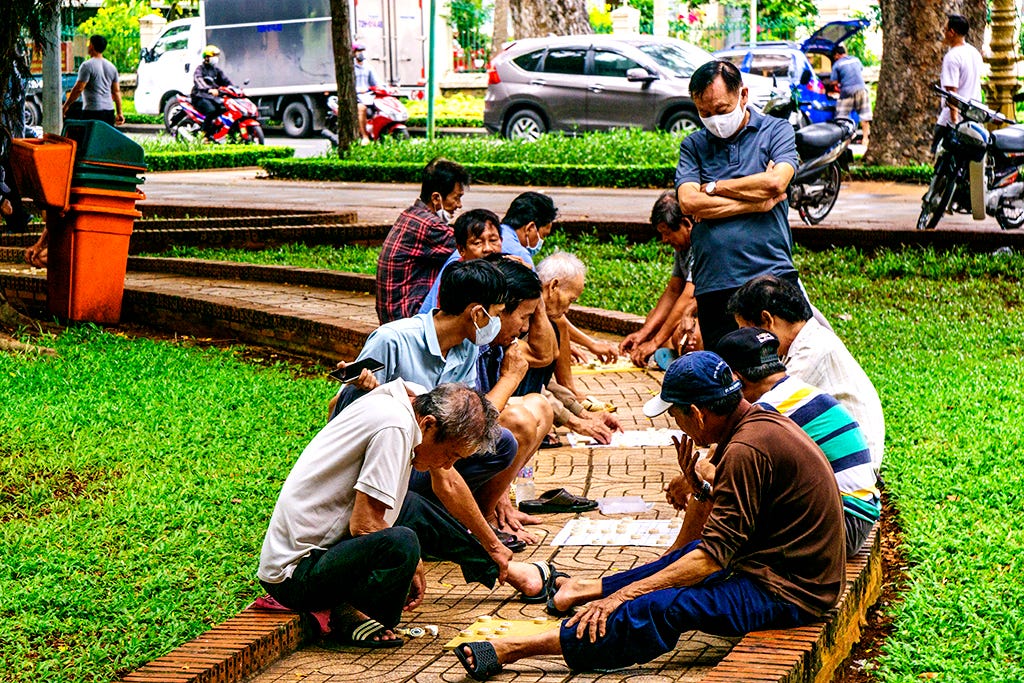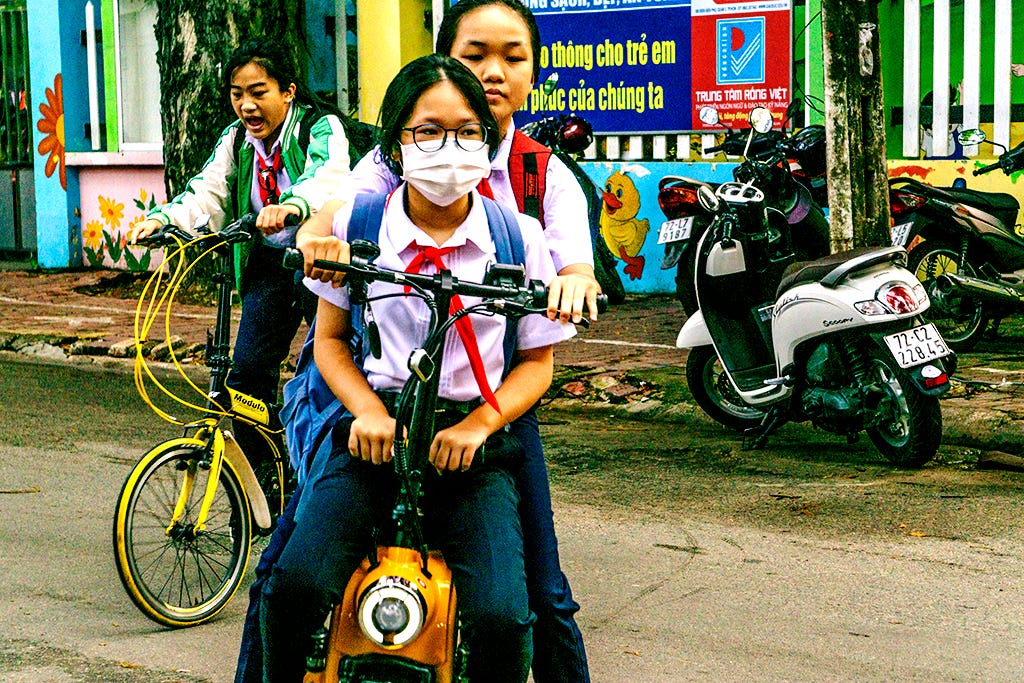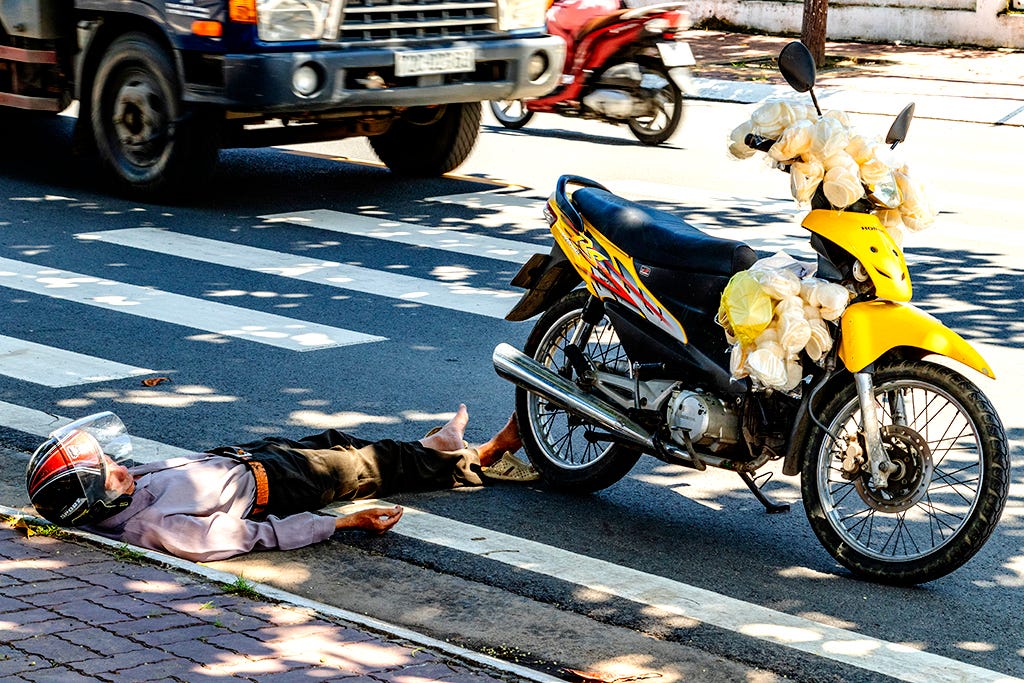[Vung Tau, 9/30/22]
At Cafe Ca Dao, I tend to sit at a stone table outside. Though hotter there, it’s quiet. Beaded with sweat, I type.
From a small window directly in front of me, a girl of about six examines the sweating oddball. Finally, she walks out, “What are you doing, grandpa?”
“Grandpa is typing,” I smile as she eyes me questioningly. “Grandpa is a writer.”
After retrieving some images from the internet, I turn my laptop towards her, “Look! These are grandpa’s books. Grandpa is a writer.”
Since anyone can claim anything, she still has that doubtful look. I can show her a Vermeer or Canaletto and say I painted it.
“People know grandpa?”
“Yes, many people know grandpa,” I crack up to show I’m jesting.
“People remember grandpa?”
“Yes, many people remember grandpa.”
Still unsmiling, she walks back inside.
That’s it, it’s a sketch. Whether in writing or painting, sketches are studies or building blocks for larger works, but in themselves, they’re interesting enough, and I’m saying this without claiming my sketches are worth your time.
Sketching from life is an attitude. Of the 6th century BC poet Anacreon, only fragments remain, so we must rely on others’ judgements to flesh him out.
Here’s one verdict from a contemporary, “In general, thoughts which are pure are thoughts of simplicity… More particularly, one would call ‘simple’ the thoughts of unaffected and to some extent childlike, not to say stupid, natures. For example, it is ‘simple’ to go over events and recount them when there is no necessity and no one is asking a question. Most of Anacreon is like this […]”
Pure, simple, unaffected, childlike and even stupid, Anacreon recounted events no one else gave a shit about. Sounds like my ideal poet! Isn’t it enough to observe and sketch, if just with one’s mind, all that’s normal?
Forget poetry. Shouldn’t everyone glory in the most ordinary? Before this new normal insanity, most people already did, when they sat in dive bars, cafes or parks, when they could enjoy each other’s beatific faces without cellphone distraction or, even more perversely, facemask barriers. How sick must you be to insist on suffocating babies?
Discussing minor painters, Pliny the Elder mentions Serapio, who was great with scenes but couldn’t paint people. One Dionysius had the opposite problem. Most interesting, though, is Piraikos. Though he ranked among the best skillwise, Piraikos focused on lowly subjects, so became known as ρυπαρός γράφος, a painter/recorder of grime/filth/dirt. To not just survive but thrive, dude didn’t mind mixing it up or getting mud splattered. His small paintings fetched more than others’ large pictures of noble subjects.
When I overreach, when I force my braincells to stand on tiptoes, so to speak, I can feel a headache coming on, so I better cut this shit out. Time for a gulp of hot tea. It’s just after 9AM on a Saturday. If I see Scottish Jimmy later, I’ll give him more pointers on Vietnamese, for he’s been here seven years and still can’t say much more than, “An iced coffee, sister.”
Jimmy has the vocabulary, sort of, but not pronunciation. Plus, the many quirks of Vietnamese trip him up. The primary purpose of each language, though, is to exclude outsiders. That’s how spies are exposed, captured and shot.
Ever noticed there are no nudes in traditional Chinese art? Nor drunk peasants, tooth pullers, lecherous old men, pickpockets or battlefield corpses, etc., nothing dirty or disgusting, so no open mouths with crooked, broken or missing teeth even, no lewd postures or spontaneous, unchecked behavior, no carousing. Disdaining lowly normality, traditional Chinese art failed to depict all of life, so there was no Chinese Jan Steen or William Hogarth. Rembrandt made prints of a monk fornicating in a wheat field, and a woman urinating and defecating.
To be fair, all Oriental cities and towns are like a Steen or Hogarth painting, all day long, so Orientals don’t need to enter museums to glimpse teeming life. Before becoming free fire zones with homeless tents, a dozen American downtowns were also lively enough. Still partying in spots, Europe glides into freezing darkness.
Cities aren’t just spectacles, but packed zoos, with you among the freakish or endearing exotica. Body among bodies, we don’t just look, but often hear, are sometimes heard and, scandalously, might even touch! What else do you want?
When Boswell confessed he might not relish London with such an “exquisite zest” if he was living there full time, Johnson said, “Why, Sir, you find no man, at all intellectual, who is willing to leave London. No, Sir, when a man is tired of London, he is tired of life; for there is in London all that life can afford.”
Just the memory of Naples can ward off unhappiness, Goethe claims, “One may write or paint as much as one likes, but this place, the shore, the gulf, Vesuvius, the citadels, the villas, everything, defies description. In the evening we went to the Grotta di Posillipo and reached it just at the moment when the rays of the setting sun were shining directly into the entrance. Now I can forgive anyone for going off his head about Naples, and think with great affection of my father, who received such lasting impressions from the very same objects as I saw today. They say that someone who has once seen a ghost will never be happy again ; vice versa, one might say of my father that he could never be really unhappy because his thoughts could always return to Naples.”
18th century London and Naples may have been all that, but one can soak up glorious normality anywhere, at any time, though it’s much harder, admittedly, in 21st century northern Virginia, say. Thoreau was continuously enchanted by his native Concord, as was Robert Walser in provincial Biel. One of the greatest “short stories” ever is his “The Walk.” A series of sketches and reflections, it has no plot.
It is Sunday. Normally, I open my window before 4:30AM to hear church bells, but this morning, I overslept. Opening my eyes after 6, I still caught cocks crowing and geckos tsk-tsking my innumerable sins. They should look in mirrors, too, I thought.
On the way to Cafe Ca Dao, I stopped for a $1.68 breakfast of bread, tiny salad, egg sunny side up, pate, hot dog and a “steak” so small, it was just a large mouthful. All the protein was presented on a cow shaped skillet, a quaint touch I hope will survive.
After my fourth visit to this eatery, the proprietress started calling me “dad,” though “uncle” or even “older brother” would have been sufficient.
Poor Jimmy is very confused. The other day, he asked me to explain mình, a word that can mean body, we, us or even one’s spouse. He must grasp mình and so many others to be matriculated into this body, and though he might not make it, it’s OK, for everyone can see he’s trying. Wandering into alleys, he sits among us, a body among bodies, each one dirt surfing into life.
[Vung Tau, 9/26/22]
[Vung Tau, 10/1/22]






The wisdom of children. That little girl asked you 3 insightful questions. Lately I am wondering if those three questions can't define a life. What are you doing? Do people know you? Do people remember you?
It's the answers to those very questions which are haunting my days, and even more so the nights right now. My answers are indictments of my life. I'm doing nothing. Nobody knows me and nobody will remember me. Somehow I always foresaw this would be how it ended for me. It's almost as if I have achieved a lifelong goal. Others seem to die suddenly, without warning. Now they're here, then they are not. For me dying has been hard, a lifetime's effort as I have bit by bit dismantled the life into which by no effort on my part, I fell into. Now I am almost done. Almost the only thing remaining is for my body to stop. Time to find somewhere to park it for the final stage.
Be glad you could answer her questions satisfactorily Linh. My own answers would have elicited a scowl of contempt I suspect. Little children with hopes and aspirations would not forgive my own profligacy with the precious gift of time.
Being tired of life from the beginning (is reincarnation a thing?), I have spent my entire life outside cities, with a few exceptions in Vancouver and Cape Town, for awhile.
I am not a daring person but need space.
Soon I will get up and make myself a cup of herbal tea in a brown pottery tea pot from Germany and pour it, over and over, into one of a set of little brown tea cups which are white porcelain on the inside and woven material on the outside. I have always thought they were from Vietnam but I am not sure why. Like most nice things I own I picked them up at an opportunity shop (thrift shop to you). I will raise my cup to your postcards and to your determination to share your sketches with us in the face of a world which has always been mad. I am not sure which I enjoy more, your sketches or your photos. Good morning!